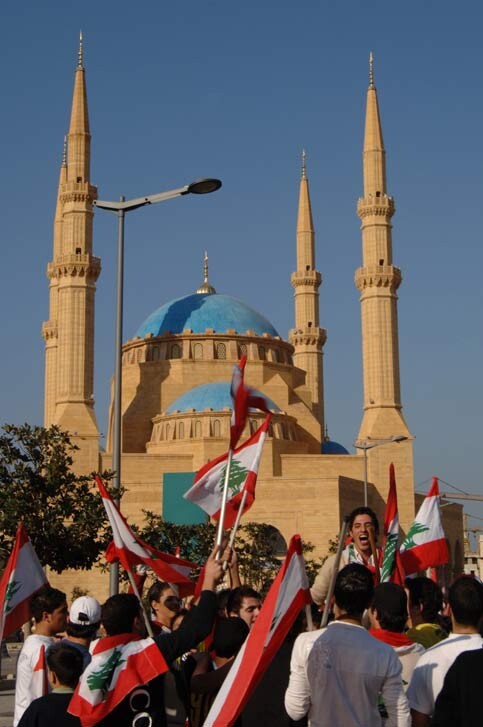Lebanon 9 January 2007

Hundreds of thousands of opposition supporters wave Lebanese flags during a demonstration in a bid to bring down the government, Beirut, 1 December 2006. (Dina Debbas/IRIN)
The last week in 2006 wasn’t just about the celebration of the holidays. There’s also the anti-government protest, the hanging of the Iraqi leader Saddam Hussein, and politics in the Middle East. Let’s start with the non political posts.
The environment was the concern of Dove’s Eyes View who comments on the Bush’s administration most significant concessions to date on the dangers of global warming as it proposes protecting the polar bears. This, she wrote, marks a reversal by the administration from its reluctance to acknowledge the consequences of climate change.
And Layal voices the concern of a Lebanese youth who refuses to leave Lebanon despite the current political conditions and even though all of her high school and university friends are traveling abroad.
The hanging of Saddam Hussein brought many bloggers back from their holiday-break. The following is just a sample of the opinions and comments on the subject.
Pierre Tristam wrote about the hanging of Saddam Hussein in a very strongly worded critique about the invasion of Iraq in what is known as Operation Iraqi Freedom and about the policies of the US administration in the Middle East:
There was, at dawn on Saturday, no “justice” meted out in the assassination of Saddam. It couldn’t even have that Mussolini feel about it: a popular execution in broad daylight, unafraid and unquestioning, because in this case the executioners themselves have too little to distinguish them from the executed. It isn’t just their faces that are masked, but their motives and future plans. Meanwhile the hanging has been merely the enactment of a scene written in American stage directives almost two years ago, to fulfill another one of those sensational benchmarks the Bush administration invented as substitutes for real strategy, for policies that could make a workable difference for Iraq.
Sophia also had this to say about the hanging of Saddam:
Saddam’s hanging will always be remembered not for his crimes and his tyranny on his own people but it will be remembered for the US’s dirty politics in the Midlle East…
Saddam’s trial and hanging were not meant to return dignity and justice to Iraqis but were meant as terrifying examples for other Middle East head of states of what might happen to them of they don’t comply…
Dr. Victorino sees that to understand the implication of Saddam’s execution one has to listen to the statements from the Israeli officials.
Marxist from Lebanon also joins in criticizing the timing and the manner of the execution of Saddam.
The local issues of the Lebanese political arena as well as the politics of the Middle East were also topics for posts in some of the blogs.
The anti government protest in Beirut is the subject for a photo essay by [ j i m m y ] who states that:
It’s the protest of the modest and the forgotten… I was impressed by the number of small discussion forums which were taking place all over the place, all at the same time. Every party had been organizing a discussion or a debate over the subjects related to the protests and most events were taking place on a day-long basis.
Next to the very large protests going on, a small protest, by about ten young independent Lebanese took place in Beirut to call for the improvement of the conditions of the youth of Lebanon and was posted about by Bashir.
Lazarus wrote about a long-term strategy for the deconfessionalisation of the Lebanese confessional (sectarian) system that will ensure potential benefits and avoid destructive blowbacks.
Here is one of a long list of questions that Bech considers when he thinks of politics in the Middle East:
Why is the “Left” the biggest loser in the Middle East? What can we learn from this defeat? To what extent are ‘Islamic’ parties an expression of ‘leftist’ concerns and demands? Should we revise our whole understanding of Leftism as too Eurocentric?
Finally, Abu Kais comments on the call for the assassination of the Syrian president and on the execution of Saddam:
It’s a messed up region, and Lebanon is no exception. This year, the new dictators club will try to spread their reign and leave their marks everywhere in the region and the world. In Lebanon, March 14 will find itself forced to fight the battle with weapons of comparable strength, or die. As Jumblatt probably knows, in the Middle East, taking away the soul takes away the freedom. And freedom is worth many souls, on both sides.
Moussa Bashir is a Lebanese blogger.
Related Links




